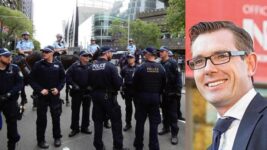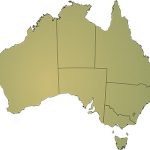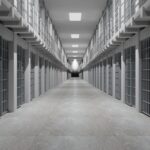NSW Coalition Government Launches Yet Another ‘Tough on Crime’ Drive

With a state election looming, and the integrity of the Liberal Nationals under question nationwide, the Perrottet government, in conjunction with the NSW Police Force, has launched something of a tough on crime campaign aimed at garnering voter support and gifting police enhanced powers.
Obtained by the Herald, secret December 2021 briefings from NSW police assistant commissioner Stuart Smith warned senior ministers that the force is dealing with a surge in organised crime, which he described as his officers “swinging a pool noodle” as they stare down crime bosses with guns.
The senior officer also decried our state’s anti-organised crime laws as lacking.
But not to worry, as it came to light last week that NSW ministers have been drafting fresh unexplained wealth laws since the Smith briefing late last year, which will enhance the state’s ability to acquire assets found to be or likely to be the proceeds of crime.
Mind you, BOCSAR released crime statistics for the 2021 December quarter in March, which outline that most crimes are “at historic lows”. Murder, robbery, burglary, car theft, stealing offences and malicious damage were all at their lowest rates since the bureau began collating such data in 1995.
This week has further seen the law enforcement drive bolstered with the establishment of a new taskforce to combat an evidently escalating gangland war in Sydney, while laws just took effect that permit the ongoing enhanced surveillance of those convicted of serious drug crimes in the past.
Drug war frenzy
A two-year trial of trial of the Drug Supply Prohibition Order (DSPO) scheme commenced on 16 May. Passed 18 months ago, the Drug Supply Prohibition Order Pilot Scheme Act 2020 (NSW) permits the much-derided program to operate in four areas: Bankstown, Dubbo, the Hunter and Coffs.
Basically, the laws allow police to seek magistrate’s approval to have an individual placed on a DSPO. To be eligible a target must be over the age of 18 and have previously been convicted of a serious drug offence – such as trafficking or manufacture – within the last ten years.
Section 4 of the DSPO Act sets out that once an individual is on an order, officers can stop, search and detain them without a warrant at any time, as well as search their premises or vehicle, when holding a reasonable suspicion, and anything drug-related or deemed dangerous can be seized.
This erosion of basic justice principles is not unprecedented. Since 2013, the state has been running an enhanced Firearms Prohibition Order scheme, which, the Ombudsman found, had resulted in 642 order-related searches in its first 10 months, yet not one search had turned up a firearm.
Revenue raising
In his briefing, assistant commissioner Smith outlined that the state’s soft anti-organised crime laws are leading criminal networks and bikie gangs, to not only carry out assassinations, drug trafficking and money laundering, but further rort state and federal government schemes.
These warnings prompted NSW attorney general Mark Speakman and then police minister David Elliot to commence drafting new unexplained wealth laws last December, which the state’s top lawmaker is still in the midst of doing, now with the assistance of new police minister Paul Toole.
Unexplained wealth and proceeds of crime laws permit governments to seize property procured via illegal activities or used in the commission of breaking the law, as well as confiscate finances that are found to have been obtained unlawfully.
NSW already has thorough laws governing the requisition of illegally acquired property within the Confiscation of the Proceeds of Crime Act 1989 (NSW), as well as others that permit confiscating property merely suspected of being crime-related in the Criminal Assets Recovery Act 1990 (NSW).
The Turnbull government enhanced federal unexplained wealth laws in 2018, making them cross-jurisdictional.
However, laws like these have been coming under increasing scrutiny due to the way they’re often applied to small-time offenders, rather than being used to target crimes bosses, which is the purported reasoning for enacting them in the first place.
As Civil Liberties Australia CEO Bill Rowlings pointed out to Sydney Criminal Lawyers in January, these types of laws are increasingly turning tidy profits for governments, and in some jurisdictions, DPPs have been hiring extra staff to concentrate on cases that generate such revenue.
Invoking the threat of gangs
So, Speakman appears to be dealing with the laws that permit the state to acquire a greater amount of wealth from the allegedly criminal amongst us, which still leaves the assistant commissioner with that issue regarding his “pool noodle” swinging officers.
And that’s what Taskforce Erebus is all about.
Launched this week, Erebus aims to strengthen the ability of officers to deal with the western Sydney gang war, which has apparently been underway for 18 months and has claimed the lives of 13 gang members. The last being Rami Iskander in Belmore on 14 May.
Along with the killings, the taskforce is also targeting related criminal activity, which includes further acts of violence, the importation and supply of illegal drugs, illicit firearm supply, as well as vehicle thefts. And Erebus resulted in 10 arrests of gang members within its first 48 hours in existence.
Obviously, NSW police now has drug supply prohibition orders in its toolbox. And these can be placed on any gang members with prior drug convictions, which will allow for the enhanced monitoring of any individual a magistrate is convinced needs that extra level of surveillance.
But in terms of any further anti-organised crime laws that enhance basic police powers in the face of the rising gangland threat in western Sydney, we’ll just have to wait and see what Speakman and Toole can concoct as we head towards the next state election.
Manufacturing votes
Most major crime categories have been steadily trending downwards since the turn of the century.
However, the increasingly intrusive criminal laws that have been passed over that time, as well as the ever-rising numbers in prison, and the billions of public funds being spent on expanding the state’s network of correctional facilities, do not reflect the dropping crime rates.
Indeed, the only crime categories that have been on a steady increase over the last five years, according to BOCSAR, are sexual assault and domestic violence-related assault, which aren’t addressed in this new tough on crime drive. But gendered violence is always left off the agenda.
Just like those in the past, this current tough on crime drive is designed to garner votes as it plays on the fears of constituents.
And since the news of declining crime rates doesn’t generate voter anxiety, an out of control gangland war in western Sydney might do the trick in conjuring back some of that confidence in strong Liberal Nationals governance.







